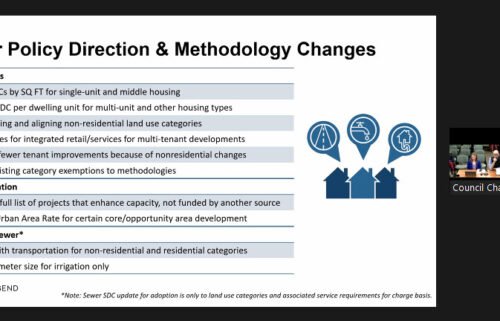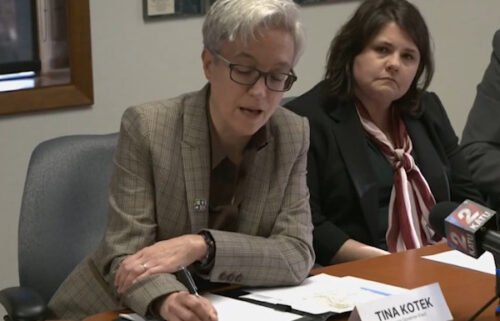Oregon lawmakers adjourn 2022 legislative session

SALEM, Ore. (AP) -- Oregon lawmakers adjourned the 2022 short legislative session Friday after passing ambitious legislation, including overtime pay for farmworkers, $600 stimulus payments for low-income workers and a $400 million spending package focused on affordable housing and homelessness.
“When we first convened— and I addressed this chamber for the first time as speaker I said that, ‘I believed” that this could be the most significant short session we’ve ever had’ and I truly believed that,” said House Speaker Dan Rayfield. “Today, I want to thank all of you and the community, because together we got truly an incredible amount of work done in service of our communities and Oregonians across the state.”
Republicans, who are in the minority in both chambers, had argued that during the traditional short session lawmakers should have focused on addressing budget fixes and technical issues from the previous year.
However, Democrats remained adamant that some larger challenges needed to be addressed — including the pandemic, historic wildfires, affordable housing, access to health care and workforce disparities.
One of the bills Republicans specifically criticized for being a “big issue” they said should be addressed during long sessions that occur during odd-numbered years requires farmworkers be paid 1.5 times their normal rate once they work more than 40 hours a week.
The bill passed on party lines, but not without Republicans showing their displeasure and reserving their right to require that bills be read in full before a final vote. Parties have routinely agreed to waive the constitutional rule it in the interest of efficiency until it became a popular bargaining chip for Republicans in 2016.
However the session was seemingly less tense than previous ones — most recently September’s redistricting special session that was marked by a broken deal, GOP walkout and accusations of gerrymandering.
One considerable olive branch came when Democrats proposed $100 million for lawmakers to spend essentially as they see fit in their rural Oregon districts. The investment passed.
In addition, this session there was a wave of new leadership. The House elected a new speaker: Rayfield. The Democrat from Corvalis replaced longtime House Speaker Tina Kotek, who stepped down to focus on her campaign for governor. In addition Democratic Rep. Julie Fahey became the new House majority leader, Republican Rep. Vikki Breese-Iverson the new House minority leader and Sen. Tim Knopp is the new Republican leader for the Senate.
This session also was the final one for Senate President Peter Courtney, a Salem Democrat, who is the Oregon’s longest-serving state lawmaker with 38 years.
“He has been a legend,” said Republican Sen. Fred Girod. “And the state’s a heck of a lot better because Peter Courtney has been here.”
The session began in the midst of Oregon’s omicron surge and ended a week before the state is set to lift the statewide indoor mask mandate and nearly two weeks before the end of a two-year long COVID-19 emergency declaration .
Decreasing coronavirus-related safety measures and restrictions were noticeable in the Capitol where the public was allowed to attend the session in-person for the first time since March 2020. However both lawmakers and the public were required to wear masks in the building – a mandate that was protested Republicans.
During the session, the Senate voted 18-9 to temporarily kick Republican Sen. Dallas Heard out of the building for not complying with the mask requirement and refusing to leave the chamber.
Some of the notable bills that passed this session included heat relief for vulnerable Oregonians, protections for election workers, setting up rulemaking for the private forest accord and giving nurses access to a program that provides mental health and wellness support.
In addition, lawmakers passed significant spending packages, made possible by $2.5 billion in revenue that wasn’t taken into account when the state budget was passed last year.
One of the largest investments was $400 million to urgently address affordable housing and homelessness in a state that has one of the highest rates of unhoused people in the country.
Another approved spending packages is Gov. Kate Brown’s $200 million “Future Ready Oregon” workforce development plan, which aims to prioritize key populations disproportionately impacted by COVID-19 and existing disparities.
News release from Gov. Kate Brown's office:
Governor Kate Brown Commends Legislature for Bipartisan Action to Pass Agenda to Help Oregon Families Thrive
Economic Growth: Investments in Future Ready Oregon, child care, and housing & homelessness help working families, open doors of opportunity to underserved communities
Natural Resources: Private Forest Accord, Elliott State Forest bills strike balance between habitat preservation, responsible development to create rural jobs
(Salem, OR) — Following the Oregon Legislative Assembly’s adjournment sine die of the 2022 legislative session, Governor Kate Brown today commended legislators from both parties for passing her agenda to help Oregon’s working families thrive.
“I’d like to thank Senate President Peter Courtney, House Speaker Dan Rayfield, and the entire Legislature for coming together to pass a robust package of bills this year that will help Oregon’s working families. We had an opportunity this session to make big and bold investments to spur economic recovery after two years of unprecedented challenges.
“And, we had a responsibility to address the current and historic disparities that were laid bare by the pandemic, which disproportionately impacted Black, Indigenous, Latino, Latina, Latinx, Asian, Pacific Islander, Tribal, and people of color, people with low incomes, and rural Oregonians. Thanks to the work of Oregon’s Racial Justice Council and the BIPOC Caucus, equity was at the heart of so many important pieces of legislation that are on their way to becoming law.
“Working together this session, we have passed bills to expand opportunities and address the needs of Oregon’s working families in every community across this state; to protect our forests, fish, and wildlife while also creating jobs in rural Oregon; and, to ensure that we are centering the voices of Oregonians who are too often not heard, as we continue to build a just and equitable Oregon.”
Governor Brown’s priority bills included the Future Ready Oregon workforce development package, as well as bills to expand child care for working families and address the affordable housing crisis in Oregon. The Legislature also took action to pass a package of natural resources bills proposed by the Governor, including bills on the Private Forest Accord and Elliot State Forest, built around habitat preservation and responsible development to foster economic growth and job creation in rural Oregon. And, the Legislature passed the Governor's legislation to foster environmental justice as Oregon continues to address the impacts of climate change on historically-underserved communities.
Investing in Working Families
- SB 1545, Future Ready Oregon: Invests in a broad range of workforce strategies aimed at getting Oregonians access to the job training, education, and resources they need to get into good-paying, skilled careers that meet the needs of employers today and into the future.
- HB 4005, Child Care: Invests $100 million to expand child care access across the state to serve more families, and provides professional learning opportunities and higher compensation to develop and retain child care providers.
- Housing & Homelessness: Through HB 5202, invests $400 million to increase affordable housing development, preserve at-risk manufactured housing, build community resiliency through individual development accounts, and expand homeownership support and counseling.
Natural Resource Preservation and Environmental Stewardship
- SB 1501 & SB 1502, Private Forest Accord: Establishes new assurances and protections for sensitive aquatic species on over 10 million acres of private forestland in Oregon, and puts forward a timeline for applying for a federal Habitat Conservation Plan.
- SB 1546, Elliott State Forest: Implements the Governor’s plan to keep the Elliott State Forest in public ownership and preserve it for future generations by investing $121 million in the common school fund to decouple the forest from that fund.
- HB 4077, Environmental Justice Council: Expands capacity of the Council (formerly the Environmental Justice Task Force) with dedicated staff and funding, and creates a centralized data and information hub to inform environmental justice.
Budget Investments
- $7.5 million to extend the Oregon Strong Start program, which bridges the transition from high school to college for students from high poverty and BIPOC communities across Oregon.
- $120 million to relocate Harriet Tubman Middle School to another site in the Albina area with better air quality. $19 million to establish an Oregon Tribal Student Grant program.
- $5 million to the Oregon Conservation and Recreation Fund to preserve critical wildlife like otters and bees. $2 million for a municipal wildfire assistance program to aid Oregon communities in on-the-ground recovery actions from the 2021 wildfire season.
- $100 million to increase behavioral health housing.
- $15 million for community violence prevention grants.
---
News release from Office of the House Speaker:
2022 Session Ends with Investments in Education, Housing and Working Families
Additional funding to support rural Oregon, climate resilience, community safety and violence prevention
SALEM – Following the conclusion of the 2022 legislative session, Oregon House Speaker Dan Rayfield issued the following statement:
“I truly believe this was the most significant short session the Legislature has ever had. After two years of crises, we focused on supporting Oregonians who are still hurting the most.
“We are taking critical steps to prevent homelessness and invest in affordable housing. We are supporting our educators facing severe burnout to ensure our students can stay in healthy, safe classrooms five days a week. For the second year in a row, we are supporting an expansion of summer learning options for families across the state.
“We are addressing the rising cost of living through direct relief payments, investments in affordable child care, and by protecting health care coverage for low-income Oregonians.
“We are investing in community safety and violence prevention, aiming to break the cycle of violence through proven methods and programs while ensuring we are addressing the ongoing behavioral health crisis in our state.
“And we are making infrastructure investments in all corners of Oregon, which will create good-paying jobs, make our communities more resilient, and lower greenhouse gas emissions.”
News release from Office of the Senate President:
Legislature Wraps Up 2022 Session
SALEM – The Oregon State Legislature completed its 2022 session on Friday, March 4th.
“The 2022 session has ended,” said Senate President Peter Courtney (D-Salem). “We worked hard. We passed a good budget. We fixed important problems. There were tough fights, but we all fought for Oregonians. The Legislature has done its most important duty: to make the state better today than it was yesterday. I think we did OK.”
SUPPORTING OUR COMMUNITIES
The Legislature ended its 32-day session after approving a balanced budget and making investments in communities across Oregon. The new funding will support construction projects, services, and economic development that move Oregon forward.
The new budget also includes urgent funding to address Oregon’s homelessness and housing crises. A $400 million housing package will build new affordable housing and directly support local governments in providing temporary shelters and services for homeless individuals.
INVESTING IN OREGON’S KIDS
The Legislature approved $150 million in funding for the 2022 Summer Learning Package, creating new opportunities for kids to learn, play, and keep active over the summer months.
The investment, introduced by President Courtney and Senator Michael Dembrow (D-Portland), allows school districts and community organizations to repeat and expand programs—such as enrichment activities, academic learning, mental health services, and summer school—created through last year’s historic summer learning investment.
“We have to be aggressive about education,” said President Courtney. “Our children have really been affected by this pandemic. We pushed hard for summer learning last year. Parents and teachers told us it had a big effect on kids. Summer learning has to become permanent.”
Other important education bills passed this session will support school districts in communities hit hard by the devastating 2020 fire season, expand eligibility for the Oregon Promise grant program, make child care more affordable, and boost the state’s education workforce by distributing $100 million in grants to hire new school staff and address teacher burnout.
“This is a big step forward for our students… but we can’t stop here. The year-round school has got to come,” said President Courtney.
GROWING OUR MENTAL HEALTH SYSTEM
Lawmakers worked to address gaps in the state’s behavioral health system this session, delivering investments that will make it easier for Oregonians to receive treatment.
These investments include $100 million for Community Mental Health Programs to increase the availability of behavioral health housing and residential treatment beds. The new funding, introduced by President Courtney, will help prevent people facing mental illness and substance abuse disorders from becoming houseless and to alleviate bottleneck issues at the state hospital.
“Oregonians struggling with mental illness should not end up in a tent along the road,” said President Courtney. “We have to start dealing with homelessness from a mental health approach. This is a remarkable investment. We can make a difference in a person’s life before they end up in the Oregon State Hospital or on the street.”
The Legislature also passed a bipartisan bill to increase the state’s behavioral health workforce, delivering $132 million in grants to raise wages for behavioral health professionals, offer retention bonuses, and recruit and hire new staff.
PROTECTING ACCESS TO HEALTH CARE
New healthcare investments passed this session will help keep low-income individuals and families insured and support health care workers facing burnout.
The Legislature delivered support for Oregonians who may lose Oregon Health Plan (OHP) coverage after federal pandemic protections expire. The new funding will allow OHA to delay redeterminations of OHP eligibility for individuals likely to lose their coverage due to income fluctuations. The bill will also create a new bridge health insurance program that, if approved by the federal government, will ensure Oregonians have access to health insurance while they are moved out of the state Medicaid system.
Additional investments within the passed budget will support counseling and wellness programs for nurses, and provide $45 million in new funding to the Oregon Health & Science University (OHSU) to expand programs and tuition assistance that will increase the number and diversity of health care graduates entering Oregon’s workforce.
“Anything we can do to increase diversity in health care is good for all of Oregon. We can save lives by adding doctors and nurses all around the state,” said President Courtney.
BOLSTERING OUR WORKFORCE
Lawmakers took action this session to expand and support the state’s workforce, including:
- Passing Future Ready Oregon, a $200 million funding package that will create new grant programs to assist underrepresented communities in accessing the training and resources needed to obtain jobs in Oregon’s construction, manufacturing, and health care sectors.
- Requiring overtime pay for farmworkers and providing a new refundable income and corporate tax credit to help farms offset the costs of paying overtime wages.
- Approval of $600 payments to low-income workers to address the increasing cost of living and help working individuals and families afford essentials such as food, rent, and childcare. Payments will be distributed this year to Oregonians who qualified for and claimed the Earned Income Tax Credit (EITC) on their 2020 tax return or on their amended 2020 tax return by April 15, 2022.
WORKING FOR THE MID-VALLEY
Lawmakers from the Mid-Willamette Valley, including President Courtney, pushed hard this session for new investments in their communities. The budget delivered targeted investments around the Salem area such as:
- $2.5 million to assist the City of Salem with homelessness response such as temporary shelters, portable toilets and hygiene supplies, and outreach services.
- $1.2 million in additional funding for the new Salem navigation center, connecting people with supports, health services, and housing.
- $1.5 million to support the construction of the Yaquina Hall housing project, which broke ground last month in Salem. The project will create 32 new units of affordable housing for the Salem Housing Authority and 20 units of permanent supportive housing to support people experiencing homelessness.
- $2.4 million to assist the AWARE Food Bank in Woodburn.
- $3.8 million to the City of Aurora for the Aurora Fire District Fire Station.
GREYHOUND RACING AND COLLEGE ATHLETES
This year’s session saw the passage of two additional priority bills for President Courtney:
Senate Bill 1504 bans greyhound racing in the State of Oregon and ensures gamblers in states or countries where it is illegal to bet on dog racing can’t bypass local laws by sending their bets through Oregon’s remote wagering systems.
Senate Bill 1505 will increase fairness for college athletes by requiring producers of college team jerseys, video games, and trading cards to pay a royalty to each college athlete whose name, image, or likeness is used.
Both bills will take effect on July 1 of this year upon the Governor’s signature.
The Legislature will continue to work hard during the interim as lawmakers hold interim committee meetings and prepare for the 2023 session.
News release from Oregon Senate Republicans:
Short Session Revealed Need For Balance In Salem
SALEM, Ore. – Today the 2022 legislative adjourned sine die. Senate Republican Leader Tim Knopp (R-Bend) released the following statement:
“At a time when inflation is out of control, Democrats introduced a new sales tax and new spending. When Oregonians don’t feel safe in their homes, Democrats pushed an extreme soft-on-crime agenda that makes our streets more dangerous. As we close the book on the pandemic, Democrats clung to government overreach and mandates. They doubled down on blowout spending on failed government programs. Luckily, Republicans were able to kill many of the most harmful and extreme proposals this session.
“Even with our big disagreements, we got some good bipartisan things done for Oregon this session. Unfortunately, we left a lot of good policy left on the table. Short sessions reveal priorities, and the majority’s priorities were misplaced in many cases.
“Republicans stood up for law enforcement and Oregonians' safety, for better schools, more transparent and accountable government, better management of our forests, and fought government overreach. We will continue to champion innovative solutions to Oregonians' most pressing problems and make our case directly to Oregonians. They deserve more balance in Salem.”
News release from Oregon House Democrats:
| Oregon’s 2022 Legislative Session Closes with Major Investments to Respond to and Prevent Homelessness, Support Small Businesses, Working Families and Stronger Schools Democrats passed policies to address homelessness, support working families and small businesses, drive down the cost of living, invest in community safety and violence prevention, and support stronger schools |
| SALEM, Ore. – Today Oregon House Democrats finished a successful 2022 session with major investments that will support small businesses, working families and low-wage individuals across every corner of the state. With the opportunity to invest funding from state revenues and federal American Rescue Plan Act dollars, the Legislature made critical and life-saving investments in Oregonians who need it most. “We know that Oregonians have had a few tough years,” said House Majority Leader Julie Fahey (D-West Eugene/Junction City). “The work we accomplished this session will help us rebuild an economy that works for all Oregonians, not just the wealthiest of individuals and largest corporations, but our Main Street businesses and working families.” Since the start of the pandemic, Oregonians have weathered disruptions to work schedules, schools, and child care. Many have struggled to make ends meet as the wealth gap has widened. To address this, Democrats focused their efforts around five priorities: 1) urgently addressing the homelessness and affordable housing crisis; 2) supporting working families and small businesses; 3) driving down the cost of living; 4) investing in community safety and violence prevention; and 5) supporting stronger schools. Responding to and Preventing Homelessness Addressing the housing and homelessness crisis requires urgent, coordinated action. This session, House and Senate Democrats passed a housing package that includes a $400 million investment to address homelessness and connect people with shelter and critical services, build on investments to increase the supply of affordable housing, and keep Oregonians in affordable homes. “It is our duty to address this crisis with urgency,” said Representative Paul Evans (D-Monmouth). “Success will depend on coordination between state and local governments and the flexibility for local communities like Salem to execute a distinct, regional solution. I’m proud to support this multifaceted approach.” “Oregon needs to build more housing,” said Representative Mark Meek (D-Clackamas County). “As a realtor, I know that too many families struggle with rising rents and home prices. With these investments, we can continue taking an active role in building more affordable housing to help bring down costs.” Democrats also passed House Bill 4123, which will facilitate a coordinated response to homelessness by creating eight locally led pilot programs with counties, cities, tribes, and community organizations in the Mid-Willamette Valley, Eastern Oregon, Central Oregon, the Columbia Gorge, and in coastal communities. The pilot programs will help local communities leverage existing resources to better help people at risk of homelessness, while also connecting those in crisis with shelters and pathways to more permanent housing. “These pilot programs will create a more equitable, accessible and responsive system by helping our local governments and community partners provide high-level coordination, centralizing communication, and strategic planning and implementation,” said Representative Jason Kropf (D-Bend), chief sponsor of the bill. Lastly, Democrats supported creative housing solutions and wildfire recovery for manufactured housing residents. House Bill 4064 will streamline local regulations on manufactured housing and clarify that Oregonians can place prefabricated homes in mobile home parks, breaking down a barrier for households impacted by the wildfires. Stronger Schools Our kids learn best when they are in safe, healthy classrooms five days a week. To help ensure students remain in these environments, Democrats approved a $300 million investment to increase summer learning support and make our schools stronger by supporting educators facing extreme burnout. “This is a first step to address a long-standing need,” said Representative Teresa Alonso Leon (D-Woodburn), chair of the House Committee on Education. “The bill will provide important infrastructure and funding that will make a difference for this and next school year, but we are committed to finding more long-term solutions in future sessions so that our students and teachers can continue to be successful.” This investment will go towards summer learning programs and activities for K-12 students to keep them engaged and learning; addressing the workforce shortage to retain educators, school counselors, substitute teachers, mental health professionals and nurses; and supporting school districts impacted by the wildfires. “By investing in our education workforce, we can stabilize our schools and ensure our kids can thrive,” said Representative Courtney Neron (D-Washington County/Wilsonville), vice chair of the House Committee on Education. “School employees have been moving mountains to support our students through the pandemic, and this bill will help alleviate the real challenges faced by teachers, staff and school administrators. This is the beginning of a longer conversation about how we can be responsive to the needs of our education system.” “School districts have been struggling to find new employees and retain educational workers who are simply burned out,” said Representative Zach Hudson (D-Troutdale), a high school and community college educator. “I’m glad that this bill will get educators some immediate relief and break down bureaucratic barriers to hiring for our local schools.” Supporting Working Families and Small Businesses Democrats are focused on building an economy that works for everyone. That’s why this session, the Legislature supported over $200 million in investments in career pathways and programs to retain and attract workers in critical sectors, including healthcare, behavioral health, education, manufacturing, technology, and construction. In a bipartisan effort, Democrats championed a $100 million investment to help rebuild critical infrastructure in rural Oregon to support local economies and create jobs. “These will be transformational investments to improve rural communities for generations and create hundreds of good paying jobs,” Representative David Gomberg (D-Central Coast) said. “As our infrastructure ages, small towns are looking at big price tags to replace or repair water and sewer systems, bridges, and public buildings. Now with the state’s help and federal dollars on the way, we can bring lasting change to rural communities across our state.” Democrats laid the groundwork for expanded broadband access by passing legislation to take advantage of a $250 million investment from American Rescue Plan dollars and President Biden’s bipartisan infrastructure law. The legislation will create a framework for future investments, strengthen state oversight and help develop broadband access at libraries across the state, which will help families and small businesses stay connected. “Having access to quality broadband is no longer optional for Oregonians. We must take advantage of this golden opportunity to increase internet access in all of our communities,” said Representative Pam Marsh (D-Southern Jackson County). “This bill prepares our state to make smart investments using the funds we expect from the federal government and is an important step towards a robust, sustainable and truly statewide broadband system.” In a historic moment, Democrats also approved House Bill 4002, giving farmworkers overtime pay after 80 years of exclusion. This will ensure farmworkers are fairly compensated for their work and help put hard earned money back into their pockets to help cover expenses like rent, healthcare and other essential needs. “This is about fair pay and equal treatment under the law,” said Representative Andrea Salinas (D-Lake Oswego), a chief sponsor of the bill. “Oregon’s farmworkers are essential. Throughout the pandemic, wildfires, and heatwave this summer, they have put their safety and health on the line to make sure our families are fed and we have food in stores. I’m proud that we showed up for them.” Democrats also passed House Bill 4015 to increase access to loans for small businesses from $100,000 to $1 million, allowing for greater investments in small businesses and aspiring entrepreneurs across the state. “This is going to help support and jumpstart small businesses and our workforces that are the backbone of our economy and the core of where our state’s innovation lies,” said Representative John Lively (D-Springfield), chair of the House Committee On Economic Recovery and Prosperity. Driving Down the Cost of Living For too many Oregonians, covering monthly and even daily expenses has become a challenge. That’s why Democrats spearheaded a $100 million investment to expand access to affordable child care and help Oregon’s child care workforce. “As we begin to emerge from the pandemic, we must continue to build a system where every family can find care so our children have joyous, reliable, and meaningful early childhood experiences,” said Representative Karin Power (D-Milwaukie), chief sponsor of the bill and chair of the House Committee on Early Childhood. “We can only reach this goal if child care providers and workers are adequately paid for their essential and difficult work. This is an important step towards that goal.” Democrats also passed House Bill 4157, approving a $600 one-time payment to a quarter of a million low-wage households who qualify for and utilize the Earned Income Tax Credit (EITC). This will help cover the cost of daily essentials like prescriptions, diapers and groceries. “Right now many Oregonians, myself included, have been struggling to get by as the cost of living has skyrocketed,” said chief sponsor of the bill, Representative Andrea Valderrama (D-Portland). “Between these investments and a one-time payment for working Oregonians, we are helping to cover things like rent, child care, and utility bills.” To maintain access to affordable health care for low-income Oregonians, Democrats advanced House Bill 4035, which will stabilize health care coverage for approximately 300,000 Oregonians on the Oregon Health Plan after the end of the pandemic public health emergency. “Thanks to federal support during the pandemic, we have seen more Oregonians insured than ever before,” said Representative Rachel Prusak (D-Tualatin/West Linn), chair of the House Committee on Health Care. “We are putting robust plans in place so we minimize health care disruption to low-income Oregonians and come out the other side of COVID-19 with a stronger health insurance system.” Investing in Community Safety and Violence Prevention Everyone deserves to be safe in their communities. Meeting that vision will require investments in proven solutions that reduce and prevent violence, while fostering safe communities built on trust. This session Democrats made targeted investments in community-based violence prevention programs that will help address the root of the problem and reduce crime, providing funding to programs that will stop the cycle of violence. Democrats also passed House Bill 4075, making it easier for victims of crime, including small businesses, to seek restitution and be repaid for economic damages. “One of my top priorities is public safety, and this builds off of the work we’ve done to invest in gun violence prevention programs last session,” said Representative Ricki Ruiz (D-Gresham). “These are proven, human-centered solutions that will help local community organizations, partners, and coalitions who know their communities best address and curb the rising violence we’re seeing across the state.” "As a nurse, I see the impacts violence has on our communities," said Representative Travis Nelson (D-Portland). "These investments in evidence-based intervention will be critical to interrupting this cycle of violence." The Legislature also passed Senate Bill 1510 to reduce traffic stops for infractions like broken tail lights that aren’t dangerous, so law enforcement can focus on stopping serious and violent crimes. “This bill is based on the value that everyone deserves to feel safe in their neighborhood,” said Rep. Janelle Bynum (D-Clackamas), chair of the House Committee on Judiciary. “By ensuring law enforcement can focus on serious crime and taking proven steps to reduce recidivism, we can build a public safety system that promotes equitable treatment and protects every Oregonian.” --- With the close of the session, Democrats will spend the next several months meeting with their communities, continuing to solve problems for constituents, and working toward future legislation that meets the needs of all Oregonians. |



